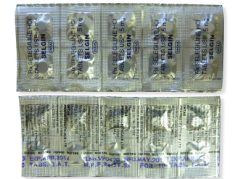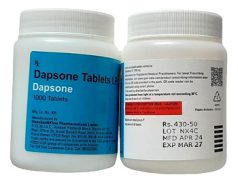Namenda

Namenda
- In our pharmacy, you can buy Namenda without a prescription, with delivery in 5–14 days throughout Australia. Discreet and anonymous packaging.
- Namenda is used for the treatment of moderate to severe Alzheimer’s disease. The drug acts as an N-methyl-D-aspartate (NMDA) receptor antagonist, helping to regulate glutamate activity in the brain.
- The usual dosage of Namenda starts at 5 mg once daily, increasing to a maintenance dose of 10 mg twice daily (total 20 mg/day).
- The form of administration is a tablet.
- The effect of the medication begins within a few hours of taking it.
- The duration of action is approximately 24 hours.
- Do not consume alcohol while taking this medication.
- The most common side effect is dizziness.
- Would you like to try Namenda without a prescription?
Basic Namenda Information
- INN (International Nonproprietary Name): Memantine
- Brand names available in Australia: Ebixa, GenRx Memantine
- ATC Code: N06DX01
- Forms & dosages (e.g., tablets, injections, creams): Tablets (10mg)
- Manufacturers in Australia: Lundbeck, GenRx
- Registration status in Australia: Prescription only
- OTC / Rx classification: Prescription (Rx)
Critical Warnings & Restrictions
When it comes to using Namenda (Memantine), there are significant considerations that must not be overlooked, particularly for specific populations. The elderly and pregnant women are notably at a higher risk when it comes to side effects and complications. Moreover, individuals with chronic illnesses may find their health conditions exacerbated by this medication.
To ensure patient safety, it is crucial to consult healthcare providers before commencing treatment. A healthcare professional can assess individual risks and provide tailored advice based on medical history and current health status.
Usage Basics
The International Nonproprietary Name (INN) for Namenda is Memantine, which operates under various brand names in Australia, such as Ebixa and GenRx Memantine. These brands are readily available, offering a solution for those seeking assistance with Alzheimer’s disease symptoms.
Memantine is classified as a prescription-only medication in Australia and has received approval from the Therapeutic Goods Administration (TGA). Furthermore, it has been included in the Pharmaceutical Benefits Scheme (PBS), making access to this drug more affordable for eligible patients.
Dosing Guide
Understanding how to properly use Memantine is vital for its effectiveness. For individuals diagnosed with Alzheimer's disease, the standard regimen starts with an introductory dose of 5mg taken once daily. After one week, increases can occur in 5mg increments, with a target maintenance dose of 10mg administered twice daily, amounting to a total of 20mg each day.
In instances where patients have additional health complications, such as renal impairment, careful adjustments may be necessary. For those with severely reduced kidney function (Creatinine Clearance of 5-29 mL/min), it is advisable to limit the maximum dosage to 5mg twice a day to mitigate any potential adverse effects or complications associated with drug accumulation.
For those wondering, “What if I miss a dose?” it is important to take the missed dose as soon as it is remembered. However, if it is close to the time of the next scheduled dose, skip the missed dose and continue with the regular dosing schedule. Never double up on doses.
Interaction Chart
While on Memantine, dietary choices and other medications should be taken into account due to potential interactions. Care should be taken with alcohol, as it can exacerbate side effects like dizziness or confusion, which are already common with the medication. Additionally, maintaining a balanced diet will help in overall management.
In terms of pharmacological interactions, certain medications can pose risks while taking Memantine. It is advisable to avoid other NMDA receptor antagonists or drugs that may raise urine pH, as these can lead to complications or diminish the drug's effectiveness. Consulting a healthcare provider can provide clarity on what medicines should be avoided while undergoing Memantine treatment.
User Reports & Trends
Australian patients have shared various experiences using Memantine on platforms like ProductReview and health forums. The trends indicate a mix of satisfaction levels, with some praising its effectiveness in managing Alzheimer's symptoms while others reported side effects that impacted their quality of life.
Feedback highlights the importance of tailored dosage adjustments, as individuals react differently to the same medication. Many users express the need for ongoing monitoring during their treatment journey, reinforcing the value of a collaborative approach between patients and healthcare providers.
Access & Purchase Options
When it comes to obtaining Memantine, regularly visiting your local pharmacy is one of the most straightforward options. Major pharmacy chains across Australia, such as Chemist Warehouse, Priceline, and TerryWhite, stock Memantine under various brand names like Ebixa and GenRx Memantine. You can usually find it in tablet form, typically 10mg per tablet.
If convenience is paramount, online pharmacies and telehealth services provide easy access to Memantine prescriptions. E-prescriptions allow doctors to prescribe medications digitally, enabling users to order their medication online without needing a paper script. This means you can manage your dementia treatment from the comfort of your home. Just ensure the online pharmacy is reputable and registered with the appropriate Australian health authorities.
Mechanism & Pharmacology
Memantine is an NMDA receptor antagonist, a type of medication that helps in the management of dementia symptoms. By blocking the NMDA receptors in the brain, it reduces the effects of excessive glutamate, a neurotransmitter that can lead to neuronal damage when it's present in high concentrations. This action helps alleviate cognitive and behavioural symptoms associated with Alzheimer’s disease.
In clinical pharmacology terms, Memantine's mechanism involves modulating the excitatory neurotransmission in the central nervous system, which is crucial for cognitive functions. It’s classified under psychoanaleptics and anti-dementia drugs. Understanding terms like receptor antagonism and neurotransmitter modulation can provide deeper insights into how Memantine works at a biological level.
Indications & Off-Label Uses
According to Therapeutic Goods Administration (TGA) guidelines, Memantine is approved for the treatment of moderate to severe Alzheimer’s disease. It can help improve cognition and daily functioning for patients facing these challenges.
However, healthcare professionals in Australia sometimes prescribe Memantine off-label for other conditions, despite its primary indication. These off-label uses may include conditions like vascular dementia or other neurodegenerative disorders. While there’s ongoing research around these uses, they remind patients to consult their doctors for tailored advice.
Key Clinical Findings
Significant studies from 2022 to 2025 have shed light on Memantine's efficacy in treating dementia. A recent Australian clinical trial noted that participants experienced notable cognitive and behavioural improvements, as assessed by standardized testing methods. International studies have corroborated these findings, reinforcing that Memantine can significantly alter the disease trajectory in Alzheimer’s treatment.
Moreover, a comprehensive meta-analysis revealed that early intervention with Memantine may enhance long-term outcomes for patients. These compelling results underscore the importance of timely diagnosis and treatment in dementia management.
Alternatives Matrix
| Medication | Pros | Cons |
|---|---|---|
| Memantine | Minimal side effects; effective for moderate to severe dementia. | Limited indications; may not be suitable for all. |
| Donepezil (Aricept) | Well-studied; used for mild to moderate Alzheimer's. | Possible gastrointestinal side effects; can interact with other medications. |
| Rivastigmine (Exelon) | Available in patch form; suitable for those with swallowing difficulties. | May cause nausea; effectiveness can vary. |
| Galantamine (Reminyl) | May improve cognition; beneficial in mild to moderate cases. | Side effects include dizziness and small risk of heart issues. |
Reflecting on these alternatives can help streamline choices for both patients and healthcare providers, providing various avenues to explore in managing dementia symptoms effectively.
Common Questions
Patients often have pressing concerns when consulting with pharmacies about Memantine. Here are some frequently asked questions:
- What are the side effects associated with Memantine?
- How does Memantine work for Alzheimer's disease?
- What should I do if I miss a dose of Memantine?
- Can I buy Memantine without a prescription?
- Are there any specific dietary restrictions while taking Memantine?
- How long does it take for Memantine to show effects?
- What other medications should be avoided while on Memantine?
- Does Memantine have any interactions with alcohol?
Suggested Visual Content
Infographics play a crucial role in simplifying complex information about Memantine:
- PBS Pricing Charts: Include visual representations of subsidy costs for Memantine under the Pharmaceutical Benefits Scheme (PBS).
- Pharmacy Networks: Create a map showcasing pharmacy locations across Australia where Memantine is stocked, facilitating easier access for patients.
Registration & Regulation
TGA approval of Memantine is vital for ensuring its safety and efficacy in treating Alzheimer’s disease and other related conditions. The Therapeutic Goods Administration (TGA) carefully evaluates clinical data before granting approval, which involves:
- Submission of comprehensive clinical trial results.
- Assessment of manufacturing processes to ensure high-quality production.
The PBS subsidisation criteria for Memantine in Australia include:
- Confirmed diagnosis of moderate to severe Alzheimer's disease.
- Previous unsuccessful trials with other standard treatments.
This structure enables eligible patients to receive Memantine at a lower cost, improving accessibility across the country.
Storage & Handling
Proper storage of Memantine is critical for maintaining its effectiveness. Here’s what to consider:
- Household Storage: Store tablets and oral solutions at room temperature (between 20–25°C). Avoid keeping them in damp or excessively hot areas. Protect from light to prevent degradation.
- Pharmacy Protocols: Pharmacies must ensure Memantine is kept in designated storage areas, with temperature controls in place to prevent exposure to extremes.
Guidelines for cold-chain handling are essential during transport and storage to uphold the integrity of Memantine. Regular checks and monitoring help to assure all standards are met.
Guidelines for Proper Use
When dispensing Memantine, pharmacists should follow a tailored counselling approach:
- Explain how the medication works and its expected effects on dementia symptoms.
- Encourage patients to adhere to the prescribed dosage and follow up with healthcare providers regularly.
Health authorities recommend patients to:
- Record any side effects experienced and report these during follow-up visits.
- Discuss any concerns regarding their treatment with their healthcare provider.
This comprehensive counselling ensures that patients understand their treatment and feel supported throughout their journey with Memantine. Engaging with healthcare providers fosters a community approach to managing Alzheimer’s and optimising outcomes.
| City | Region | Delivery Time |
|---|---|---|
| Sydney | New South Wales | 5–7 days |
| Melbourne | Victoria | 5–7 days |
| Brisbane | Queensland | 5–7 days |
| Perth | Western Australia | 5–7 days |
| Adelaide | South Australia | 5–7 days |
| Hobart | Tasmania | 5–9 days |
| Canberra | Australian Capital Territory | 5–7 days |
| Gold Coast | Queensland | 5–9 days |
| Newcastle | New South Wales | 5–9 days |
| Wollongong | New South Wales | 5–9 days |
| Geelong | Victoria | 5–9 days |
| Cairns | Queensland | 5–9 days |








